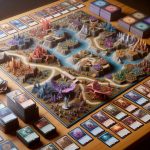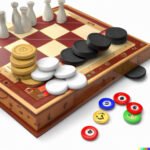Magic the Gathering Board Game Strategy revolves around a complex and strategic gameplay experience that has captivated players for decades. Whether you are a seasoned player or just starting out, understanding the fundamentals of this iconic game is crucial to success. With a combination of skill, luck, and tactical decision-making, players immerse themselves in a world of spells, creatures, and abilities to outmaneuver their opponents.
Magic the Gathering is not just a simple card game; it is a strategic battle of wits where players must carefully construct their decks to anticipate various scenarios on the battlefield. From choosing the right mix of spells to balancing your card distribution, every decision plays a vital role in shaping your gameplay experience. By mastering deck building strategies specific to your playstyle and preferences, you can create a powerful arsenal that sets you up for victory in each match.
As you delve deeper into the world of Magic the Gathering, you’ll discover the importance of resource management and efficient use of your cards. Understanding how to effectively utilize mana, creatures, and spells will ultimately determine your success on the battlefield. With advanced gameplay tactics such as bluffing, tempo control, and synergy between cards, skilled players can elevate their performance and outsmart their opponents with precision and finesse.
Understanding the Basics of Magic the Gathering
Magic the Gathering is a popular collectible card game that combines strategy, skill, and a bit of luck. Whether you are a beginner or an experienced player, understanding the basics of Magic the Gathering is crucial in developing a winning strategy. Here are some key fundamentals to keep in mind:
- Card Types: Familiarize yourself with the different types of cards in Magic the Gathering, including creatures, spells, artifacts, enchantments, and lands. Each card type serves a specific purpose in gameplay.
- Turn Structure: A typical turn in Magic the Gathering consists of several phases – beginning phase, pre-combat main phase, combat phase, post-combat main phase, and ending phase. Knowing how to navigate these phases effectively can give you an edge over your opponents.
- Mana System: Mana is essential for playing cards in Magic the Gathering. Learning how to manage your mana efficiently is key to executing your strategies and outwitting your opponents.
As you delve deeper into the world of Magic the Gathering board game strategy, it’s important to grasp the basic mechanics and rules of the game. By mastering these fundamentals, you will be better equipped to build powerful decks, make optimal plays during gameplay, and ultimately emerge victorious in your battles. Remember that practice makes perfect when it comes to honing your skills in Magic the Gathering.
Deck Building Strategies for Magic the Gathering
Building a strong deck is essential for success in the Magic the Gathering board game. With thousands of cards to choose from, it can be overwhelming to decide which ones to include in your deck. However, with the right strategy and understanding of your playstyle, you can create a powerful deck that suits your strengths and weaknesses.
Understanding Your Playstyle
Before diving into building your deck, it’s important to understand your playstyle. Are you more aggressive, preferring to attack quickly and decisively? Or are you more defensive, biding your time until you can strike with a powerful combo? Knowing how you like to play will help guide you in selecting the right cards for your deck.
Choosing the Right Cards
When selecting cards for your deck, consider factors such as mana cost, card type, and abilities. A good rule of thumb is to have a balanced mix of creatures, spells, and lands in your deck. Creatures are essential for attacking and defending, while spells can provide additional support or removal options. Lands are crucial for providing mana to cast your spells. Make sure to include a variety of cards that work well together and complement each other’s strengths.
Testing and Refining Your Deck
Once you’ve built your deck, it’s important to test it out in actual gameplay. Pay attention to how well your deck performs against different opponents and adjust accordingly. Keep track of which cards are most effective and which ones may be less useful.
Don’t be afraid to make changes and refine your deck over time based on what works best for you. Remember, building a successful Magic the Gathering deck takes practice, patience, and a willingness to adapt to different situations.
Managing Resources in Magic the Gathering
Magic the Gathering is a complex board game that requires careful resource management in order to succeed. One of the key aspects of the game is knowing how to efficiently use your resources to maximize your chances of winning. Here are some strategies to help you manage your resources effectively:
- Mana Management: Mana is essential in Magic the Gathering as it allows you to cast spells and summon creatures. It is important to have a good balance of mana sources in your deck to ensure that you can play your cards when needed. Be strategic in how you use your mana and always keep track of how much you have available.
- Card Advantage: Card advantage refers to having more cards in hand or on the field than your opponent. This gives you more options and flexibility during the game. Try to draw cards through effects or abilities that allow you to gain card advantage, while also being mindful of when to play certain cards for maximum impact.
- Life Points: Your life points are a valuable resource in Magic the Gathering, as running out means losing the game. While it may be tempting to focus solely on attacking your opponent, it is crucial to consider defending yourself as well. Balancing aggression with defense will help you stay alive longer and give you a better chance at winning.
By mastering resource management, you will be able to make smarter decisions and outmaneuver your opponents in Magic the Gathering. Remember that each decision regarding your resources can greatly impact the outcome of the game, so take the time to plan ahead and think strategically. As you practice these strategies and become more familiar with the game, you will find yourself improving and winning more matches in no time.
Advanced Gameplay Tactics for Magic the Gathering
Understanding Card Advantage
One of the key tactics in mastering Magic the Gathering board game strategy is understanding the concept of card advantage. Card advantage refers to having more cards or resources available to you compared to your opponent. This can be achieved through drawing extra cards, efficiently using your resources, and making strategic decisions on when to play certain cards. By maintaining card advantage throughout the game, you will have a better chance at outplaying your opponent and securing victory.
Timing and Priority
Another important gameplay tactic in Magic the Gathering is mastering timing and priority. Knowing when to play certain cards, activate abilities, or respond to your opponent’s actions can make a significant difference in the outcome of a match.
Understanding the stack and how effects resolve can give you an edge over your opponent by manipulating the sequence of events in your favor. By carefully timing your moves and prioritizing key actions, you can control the flow of the game and catch your opponent off guard.
Adapting Your Strategy
In Magic the Gathering, flexibility is essential when it comes to gameplay tactics. Adapting your strategy based on the current board state, your opponent’s actions, and potential threats is crucial for success.
Being able to switch gears, pivot strategies, and think on your feet will keep your opponents guessing and allow you to stay ahead in the game. Whether you need to shift from an aggressive approach to a defensive one or change targets based on new information, being able to adapt quickly will help you navigate complex situations and come out on top.
Tips for Winning Magic the Gathering Board Game
Magic the Gathering is a complex and strategic card game that requires careful planning and execution to emerge victorious. Winning in Magic the Gathering involves a combination of skill, knowledge, and a bit of luck. To increase your chances of success in this popular board game, here are some tips to consider.
One important aspect of winning in Magic the Gathering is mastering the art of deck building. Your deck is your arsenal during gameplay, so it is crucial to carefully select cards that complement each other and align with your strategy. Consider the synergy between cards, mana curve, and your overall game plan when constructing your deck. Make sure to include a good balance of creatures, spells, and other cards to give you versatility during matches.
Another key factor in winning Magic the Gathering is managing your resources efficiently. Mana plays a crucial role in casting spells and summoning creatures, so knowing how to properly utilize your mana is essential for success. Be mindful of when to play cards, when to hold back, and when to use special abilities. Understanding how to manage your resources effectively can give you a significant advantage over your opponents.
Lastly, honing your gameplay tactics is vital for achieving victory in Magic the Gathering. This includes knowing when to attack, block, use removal spells, or activate abilities on cards. Pay close attention to your opponent’s moves and adapt accordingly.
By staying proactive and making smart decisions throughout the game, you can outmaneuver your opponents and secure the win. Sharpening these skills will help elevate your gameplay and bring you closer to becoming a master strategist in Magic the Gathering board game strategy.
Expanding Your Collection for Magic the Gathering
When it comes to Magic: The Gathering, having a diverse collection of cards can greatly enhance your gameplay experience. Expanding your card collection allows you to experiment with different strategies, build versatile decks, and adapt to various opponents and playstyles.
One of the best ways to grow your collection is by participating in booster drafts or sealed deck events at local game stores or online platforms. These events not only provide an opportunity to acquire new cards but also test your deck-building skills against other players.
In addition to attending events, trading cards with fellow players can help you expand your collection efficiently. Trading allows you to exchange cards you no longer need for those that better suit your gameplay style or strategy. Before engaging in trades, it’s important to research card values and ensure fair exchanges. Online forums and trading platforms dedicated to Magic: The Gathering can facilitate these transactions and connect you with a larger community of players looking to trade cards.
Another method for expanding your Magic: The Gathering collection is by purchasing booster packs or pre-constructed decks. Booster packs contain randomized cards that can add diversity to your collection, while pre-constructed decks offer a ready-to-play option with strategic themes and unique cards.
By investing in these products, you not only acquire new cards but also support the ongoing development of the game. Overall, expanding your collection through various means can enrich your gaming experience and open up exciting possibilities for building powerful decks and mastering different strategies.
| Methods for Expanding Your Collection | Benefits |
|---|---|
| Participating in booster drafts and sealed deck events | Acquire new cards, test deck-building skills |
| Trading cards with fellow players | Exchange unwanted cards for desirable ones, connect with community |
| Purchasing booster packs or pre-constructed decks | Add diversity to collection, support game development |
How to Improve Your Skills in Magic the Gathering
Magic the Gathering is a complex and strategic board game that requires players to continuously improve their skills in order to become successful. One key aspect of improving your skills in Magic the Gathering is understanding the meta-game, which refers to the overall strategies and popular card choices in the current competitive environment.
By staying updated on the meta-game through online resources, tournaments, and discussions with other players, you can gain insights into effective deck building and gameplay tactics.
In addition to understanding the meta-game, practicing gameplay is crucial for improving your skills in Magic the Gathering. This can involve playing regularly with friends or joining local game stores for organized play events.
By playing against a variety of opponents with different strategies, you can learn new approaches, refine your decision-making process, and adapt to various playstyles. Practicing also allows you to become more familiar with your own deck’s strengths and weaknesses, as well as how to effectively use certain cards in different situations.
Furthermore, seeking feedback from more experienced players can greatly contribute to your skill development in Magic the Gathering. Whether it’s receiving advice on deck construction, receiving tips on gameplay tactics, or analyzing post-game discussions on what could have been done differently, feedback from others can provide valuable insights that help you enhance your overall performance.
Remember that improvement takes time and dedication, so don’t get discouraged by losses but rather see them as learning experiences that will ultimately make you a better player.
| Key Skill Improvement Strategies | Benefits |
|---|---|
| Understanding the meta-game | Gaining insights into effective deck building and gameplay tactics |
| Practicing gameplay regularly | Learning new approaches and adapting to various playstyles |
| Seeking feedback from experienced players | Receiving valuable insights for enhancing overall performance |
Conclusion and Final Thoughts on Magic the Gathering Board Game Strategy
In conclusion, mastering the art of Magic the Gathering board game strategy requires a combination of understanding the basics, honing your deck building skills, effectively managing resources, and implementing advanced gameplay tactics. By following the tips and techniques outlined in this article, players can enhance their chances of winning and improve their overall gameplay experience.
Expanding your collection of cards is also essential to continuously challenge yourself and adapt to different strategies employed by opponents. Investing in new cards and staying updated on the latest expansions can introduce fresh dynamics to your gameplay and keep you at the top of your game.
Ultimately, improving your skills in Magic the Gathering requires dedication, practice, and a willingness to constantly learn and evolve. By staying informed on current meta trends, practicing different strategies, and seeking advice from more experienced players, you can elevate your gameplay to new heights and enjoy the intricate complexities that make Magic the Gathering such a beloved and enduring game among enthusiasts worldwide.
So keep refining your skills, exploring new tactics, and above all, have fun strategizing your way to victory in every match.
Frequently Asked Questions
Does Magic: The Gathering Have Strategy?
Magic: The Gathering definitely has a strong strategic component. Players must carefully consider the cards they include in their decks, anticipate opponents’ moves, and adapt to changing game situations. Success often hinges on making smart decisions and outthinking the opponent.
What Are the Different Strategies in Magic: The Gathering?
In Magic: The Gathering, there are various strategies that players can employ to win games. Some players focus on aggressive strategies, aiming to deal damage quickly and overwhelm opponents.
Others prefer control strategies, which involve managing the game’s tempo and shutting down opponents’ plans. Another common approach is combo strategies, which revolve around assembling specific card combinations for powerful effects.
How Do I Get Better at Magic: The Gathering?
Improving at Magic: The Gathering requires consistent practice, understanding of game mechanics, and strategic thinking. One helpful tip is to study successful deck lists and gameplay strategies from experienced players.
Additionally, playing regularly against different opponents can help develop adaptability and decision-making skills. Lastly, seeking feedback and actively analyzing past games can provide valuable insights for improvement in future matches.

I love playing all kinds of games – from classics like Monopoly to modern favourites like Ticket to Ride.
I created this blog as a way to share my love of board games with others, and provide information on the latest releases and news in the industry.





